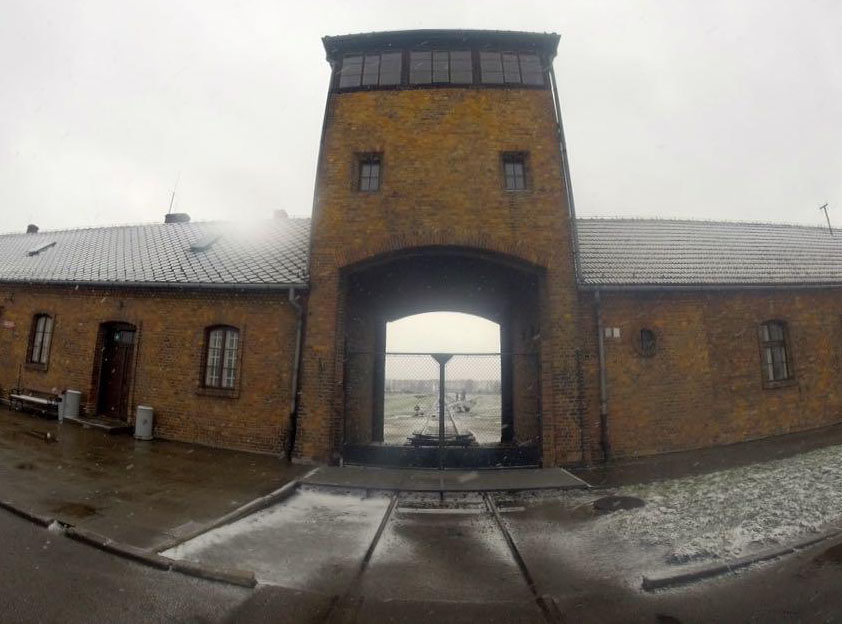70th anniversary of Auschwitz liberation bridges SMU Human Rights’ unique Holocaust education
Students in Embrey Human Rights Program mark Holocaust anniversary with trips and blogs.

DALLAS (SMU) — Tuesday, Jan. 27, marks International Holocaust Remembrance Day and the 70th anniversary of the liberation of the concentration camp Auschwitz-Birkenau, where more than a million people were systematically murdered by the Nazis during the Holocaust. This year also marks the 70th anniversary of the end of World War II, which during the Nazis’ religious and ethnic cleansing campaign resulted in 11 million deaths, including 6 million European Jews.
“All the negative forces that coalesced to make the Holocaust possible — prejudice, bigotry and hatred — still drive attacks against religious and ethnic minorities,” says Rick Halperin, director of the Embrey Human Rights Program in SMU’s Dedman College of Humanities and Sciences. He points to rising anti-Semitism in Europe and the growing number of hate crimes targeting innocent Muslims in retaliation for attacks by radical extremists under the banner of Islam.
“That’s why it’s more imperative than ever to learn the lessons of the Holocaust to create a safer and more tolerant world,” Halperin says.
SMU is globally recognized for its unique mix of Holocaust-related classes, programs and trips, including annual visits to Auschwitz-Birkenau and other extermination camps in Poland. It’s also one of only a handful of Universities in the nation to offer an undergraduate degree in human rights as well as a master’s degree program.
During SMU’s winter break the program held its annual two-week pilgrimage to Poland, and in early January, sponsored a Holocaust-focused trip to Hungary for the first time.
The Jan. 7-13 Budapest-based trip, with 12 SMU students as well as Vicki Hill, SMU’s Assistant Dean for the University Curriculum, addressed complex identity issues related to what happened in Hungary before, during and after the country’s Nazi occupation in World War II. The group met with Holocaust survivors, witnesses and rescuers, and blogged about their experiences. Read the blog and see accompanying photographs.
Though many people have heard about the notorious death camps in Nazi-occupied Poland, most aren’t aware of how an “intensely tragic scenario” in Hungary set the stage for what was to happen to European Jews.
For example in 1920, “Hungary passed Europe’s first anti-Semitic laws — 13 years before Hitler came into power in Germany and 15 years before the Nuremberg Laws made German Jews stateless,” Halperin says.
The worst, however, was yet to come. After Germany invaded the country March 19, 1944, within six weeks some 600,0000 Hungarian Jews would be dead – 500,000 after being deported to Auschwitz-Birkenau.
“In the last fanatic phase, one out of every 10 Holocaust victims and one out of every three Auschwitz-Birkenau victims were Hungarian,” Halperin says. “I don’t think people absorb the speed and efficiency of the Nazis’ murderous force in such a short period of time.”
Earlier in SMU’s winter break, Halperin and Embrey Human Rights Program Coordinator Sherry Aikman led 16 student and community pilgrims on a study tour of Holocaust sites in Poland, where some 4,375,000 people were murdered during World War II. The group was accompanied by Altshuler Distinguished Teaching Professor James K. Hopkins, an expert on European history in SMU’s Dedman College of Humanities and Sciences. Read the blog and see accompanying photographs.
Halperin has visited Holocaust sites in Poland regularly since 1983 and began leading SMU students, faculty, staff and community members there in 1996. During each pilgrimage an average of two dozen travel participants visit death camps and memorials throughout the country.
Halperin purposely designed the trip for people to visit the camps in early winter, allowing them to fully understand what Holocaust victims/survivors experienced during extremely cold weather. The pilgrims also appreciate the importance of family and loved ones from whom they’re separated during the fall holiday trip.
Holocaust-site tour guides in Poland repeatedly note that SMU’s two-week pilgrimage is the only one of its kind — “but it shouldn’t be,” Halperin says. The Embrey Human Rights Program also has a related Holocaust-focused book project in the works.
For more information about SMU’s Embrey Human Rights Program, visit the program's website or call 214-768-8347.
# # #
Related Links:
- The Daily Campus: SMU reflects, remembers the liberation of Auschwitz
- SMU-TV: SMU Observes the 70th anniversary of the liberation of Auschwitz
- SMU-TV: Prof. Ben Voth talks about the 70th Anniversary of Auschwitz Liberation
#21180-nr/web-01/27/2015-dg
